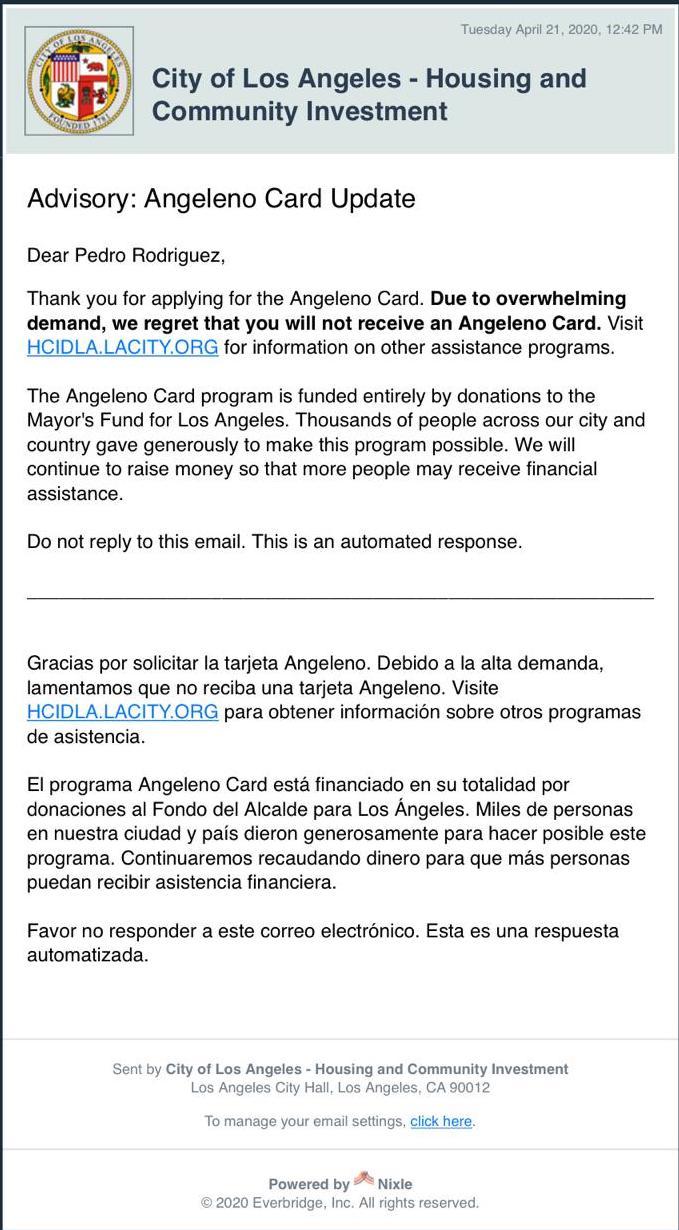Their story is that of many other immigrants who have become unemployed, and do not know how they will pay the rent
Due to a high demand for applications that exceeded the offer, Pedro Rodríguez, an undocumented immigrant, did not receive the cash aid that the Office of Mayor Eric Garcetti gave through the Angelino Card program, which consists of the delivery of debit cards Prepaid to help families most financially impacted by the coronavirus.
"When I applied, they told me they were over," says Pedro, who is desperate because as a result of the pandemic, he was no longer called from the restaurant where he worked for three years as a chicken fryer. “First they cut my schedule to four hours a week. Then they stopped calling me, ”he says.
Had you applied for the Angelino Card, you would not have qualified because you live in the city of Hawthorne in southern Los Angeles County. These cards were designed to be given only to those who live in the city of Los Angeles.

“I don't know how I am going to pay the rent for the room where I live, and that it costs me $ 600 a month. Yes, I know they said that you can talk to the owners so they can wait for you with the payment, but if with jobs you could cover the monthly rent, the moratorium will only increase the debt, and it will be difficult for me to pay when everything returns to normal . That is, if they call me back from work, because we don't know how the economy will be, ”he says.
Eager to earn a few dollars to fill out the rent, Pedro, 54, started selling face masks on the streets of Hawthorne. "The competition was great because there were a lot of people selling, but the worst thing was that the Hawthorne city inspectors threatened to give me a $ 1,000 fine and take away my merchandise if I didn't withdrawHe laments.
Pedro had invested the little money he had in the purchase of masks to sell them on the street, and to collect for rent.
“The undocumented people who are left without work, we no longer know what to do. I spent 24 years in this country paying my taxes religiously. It is useless to us, because when there is a problem like this health crisis, we are not included in federal or local aid. We don't count. ”
He wonders how he is going to abide by the 'Stay at Home' order, without financial support. "I have to look for him, go outside."
This immigrant from Sonora, Mexico, suffers from sleep apnea (respiratory problems when sleeping), and has been connected to an artificial respiration for a year and a half. It is the only way – he says – that he can rest without breathing obstructions, and thus work the next day.
"At this stage, I am no longer afraid of getting sick from the coronavirus. Rather, I am afraid of running out of a roof and ending up living on the street. I ask the government and its leaders, if they cannot help me pay my rent, to send me psychological assistance to cope with this distressing situation because I am on the verge of a nervous breakdown ”.

If anyone can provide a solution to Pedro's unemployment problem, which does not involve multi-level businesses or pyramid schemes that require initial investments, they can call: 424-800-1245.
Hispanics, the most affected
A study by the Pew Research Center conducted between March 19-24, found that 49% of Hispanics in the nation said they or someone in their family had lost their job; or had their wages cut due to the coronavirus, bought with 33% of all Americans.
Another previous PEW report indicated that nearly eight million Hispanic workers in the country work in restaurants, hotels, and other service positions, placing them at the highest risk of losing their jobs in the face of the epidemic.
California Governor Gavin Newsom announced a $ 75 million relief fund to support approximately 150,000 undocumented immigrants impacted by COVID-19 who are not eligible for unemployment benefits because of their immigration status, nor did they receive federal package checks. economic recovery.
Aid would be one-time in the amount of $ 500 per adult and up to $ 1,000 per household. That money is expected to begin to be distributed in May, and it is known that it will be given to immigrants through non-profit community organizations. An estimated 40,000 undocumented immigrants in Los Angeles would benefit.









